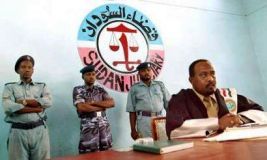Sudan reiterates opposition to try Darfur suspects before CCI
Oct 17, 2005 (KHARTOUM) — The Sudanese government has renewed its objection to refer any Sudanese national to the International Criminal Court (ICC), saying that Sudan was an independent and sovereign state that had a capable, self-reliant and impartial judiciary.

|
|
A special judge, sits in court in Nyala Sept 30, 2004 to try six Sudanese men accused of belonging to the Janjaweed, who killed 24 people in the southern Darfur region in Oct 2003.(Reuters). |
Speaking to the media after meeting with the special rapporteur on human rights in Sudan, Samar Sima, the minister of justice, Mohamed Ali al-Maradi, said that in his response to a question by the special rapporteur on the Darfur trials, he had said that the government was committed and determined to convict the suspects through the national judiciary system, and that there was no need for the ICC prosecutor.
He went on to say that Sudan had not signed the Rome charter and therefore it was not compulsory for it to be under the jurisdiction of the ICC, although it was ready to cooperate with it, provided it was not a substitute to the national judiciary.
He also explained to the special rapporteur that the criminal court which was set up to try the Darfur suspects was not a special court, formed by the chief justice and was headed by a supreme court judge who was implementing the ordinary law, and the crimes which were committed were provided for in criminal law.
Al-Maradi told the special rapporteur that there were a number of crimes which had already been ruled on, including murder and rape, and the reports being published by western media against Sudan were baseless.
The cases which the Sudanese courts examine nowadays are not related to suspects that the CCI want to try, says an internal report of The Hague court.
The first persons standing trial in the Sudanese court were accused of looting a bus and other vehicles carrying more than 100 people outside Nyala in December last year.
On 14 June, the UN Special Representative of the Secretary-General for Sudan, Jan Pronk, said the establishment of the special court was “positive, but it cannot be a substitute for the International Criminal Court.”
Announcing the formation of the Sudanese court the same week that the ICC started its own investigations was “interesting timing”, according to Pronk, who suggested that the two courts operate side by side.
The Ministry of Justice criticised Pronk’s remarks, saying the Sudanese criminal court would be a substitute to the ICC.
“ICC article 17 stipulates that it can refuse to look into any case if investigations and trials can be carried out in the countries concerned except if they are unwilling to carry out the prosecutions,” a ministry statement said.
The UN Security Council, in a resolution on 31 March, referred suspected criminal acts committed in Darfur to the ICC prosecutor in The Hague. The decision required Sudan and all other parties to the conflict to cooperate with the court.
The ICC treaty, which Sudan is not a signatory to, states that any defendant tried in fair and credible national trials cannot be retried by the ICC. The Sudanese prosecution, however, has identified only small-time criminals rather than the senior officials likely to be indicted by the ICC so far.
(ST)
